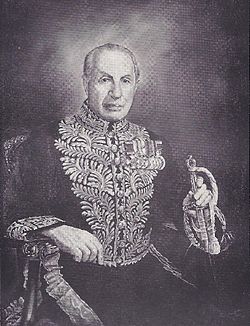John Keiller MacKay
John Keiller MacKay | |
|---|---|
 | |
| 19th Lieutenant Governor of Ontario | |
| In office December 30, 1957 – May 1, 1963 | |
| Monarch | Elizabeth II |
| Governor General | Vincent Massey Georges Vanier |
| Premier | Leslie Frost John Robarts |
| Preceded by | Louis Orville Breithaupt |
| Succeeded by | William Earl Rowe |
| Personal details | |
| Born | July 11, 1888 , Canada |
| Died | June 12, 1970 (aged 81) Toronto, Ontario, Canada |
| Resting place | Mt. Pleasant Cemetery |
| Nationality | Canadian |
| Military career | |
| Allegiance | Canada |
| Rank | Lieutenant-Colonel |
| Commands held | 6th Brigade, Canadian Field Artillery |
| Battles/wars | Battle of the Somme Battle of Vimy Ridge |
Lieutenant-Colonel John Keiller MacKay, OC, DSO, KStJ, VD, QC (July 11, 1888 – June 12, 1970) was a Canadian soldier, lawyer and jurist. MacKay served as the 19th Lieutenant Governor of Ontario from 1957 to 1963.
Early life and education[]
John Keiller MacKay was born in 1888 in the village of Plainfield in Pictou County, Nova Scotia, the son of John Duncan and Bessie (Murray) MacKay. He was educated at the Pictou Academy, the Royal Military College (1909), Saint Francis Xavier University (BA 1912) and Dalhousie University (LL.B. 1922).
Career[]
During World War I, he served in, and later commanded, 6th Brigade, Canadian Field Artillery (Non-Permanent Active Militia in the Canadian Army). He achieved the rank of Lieutenant-Colonel and was mentioned in dispatches three times and wounded twice. MacKay won the Distinguished Service Order in 1916 at the Battle of the Somme and in 1918 was seriously wounded at Arras. He left the military after the war but was involved in the formation of the Royal Canadian Legion in 1925 and was its first National Vice-Chairman. He was a freemason and was initiated in 1925 to Ionic Lodge, #25 G.R.C.
Known as J. Keiller MacKay, he was called to the Nova Scotia bar in 1922 and the Ontario bar in 1923. He was a senior partner of a law firm, "MacKay, Matheson & Martin" in Toronto, and became a specialist in criminal law. He was appointed a King's Counsel in 1933. He was appointed to the Supreme Court of Ontario in 1935 and to the Ontario Court of Appeal in 1950.
As a judge on the Supreme Court of Ontario, MacKay issued a landmark decision in 1945 overturning an anti-semitic restrictive land covenant in Toronto. A local labour organization, the Workers' Education Association (WEA), had purchased a property on O'Connor Drive, east of Broadview Avenue in Toronto, for the purpose of building a model "workingman's home", offered as a potential solution to the city's shortage of affordable housing. After buying the property, the WEA discovered there was a restrictive covenant on the deed preventing the land from being sold to "Jews or persons of objectionable nationality". The WEA and the Canadian Jewish Congress launched a court action to strike down the restriction and in his decision, issued on October 31, 1945, Mackay declared the covenant illegal and "injurious to the public good". Five years later, in March 1950, the Legislative Assembly of Ontario unanimously adopted legislation banning restrictive covenants, with Ontario Premier Leslie Frost declaring "There is no place in Ontario's way of life for restrictive covenants".
MacKay served as the Lieutenant Governor of Ontario from 1957 to 1963, and he opened the Lieutenant Governor's New Year's Levee to the general public for the first time.
In 1964, he was a founder of the Canadian Civil Liberties Association serving as honorary president.
In 1967, he was made an Officer of the Order of Canada.[1] He was also a Knight of Grace of the Venerable Order of St. John of Jerusalem and was responsible for bringing the Military and Hospitaler Order of St. Lazarus of Jerusalem to Canada.
He was married to Katherine 'Kay' Jean MacLeod and had three sons. He died in Toronto in 1970 and is buried in Mount Pleasant Cemetery, Toronto (section Q-154).

Legacy[]
In addition to his distinguished military service during the First World War; his involvement in the founding of the Royal Canadian Legion; his judicial ruling overturning anti-semitic restrictive land covenants; and his democratization of the annual Lieutenant-Governor's levee, J. Keiller MacKay's legacy includes the following:
- The "Keiller MacKay Park" at North Bay, Ontario, includes 52 homes for senior citizens.
- The "Keiller MacKay Room" in the Bloomfield Centre of Saint Francis Xavier University in Nova Scotia, which opened in 1973, features a life-size portrait of Keiller MacKay in full Highland dress.
- Major C. I. N. MacLeod, the St. Francis Xavier University's piper, composed a musical tribute for MacKay.
- The Lieutenant Colonel The Honourable J. Keiller MacKay Memorial Trophy, which is awarded for Canadian Armed Forces Regular and Reserve Marching Formations, was named in his honour.[2]
References[]
John Lorinc, "Racism in Toronto's Real-Estate Fine Print", Toronto Star, Sunday, December 31, 2017.
| Wikimedia Commons has media related to John Keiller MacKay. |
- 1888 births
- 1970 deaths
- Canadian military personnel of World War I
- Canadian Companions of the Distinguished Service Order
- Canadian Presbyterians
- St. Francis Xavier University alumni
- Schulich School of Law alumni
- Lawyers in Ontario
- Judges in Ontario
- Lieutenant Governors of Ontario
- Members of the Order of Canada
- People from Pictou County
- Canadian people of Scottish descent
- Royal Military College of Canada alumni
- Canadian Queen's Counsel